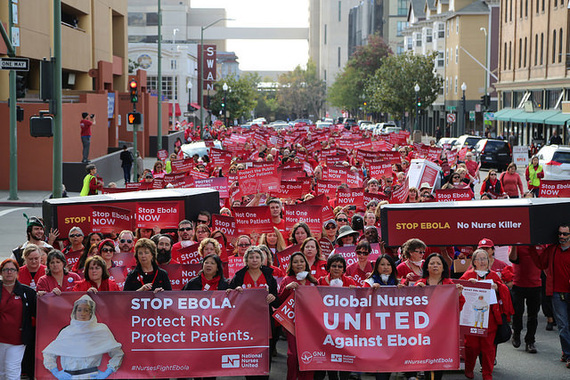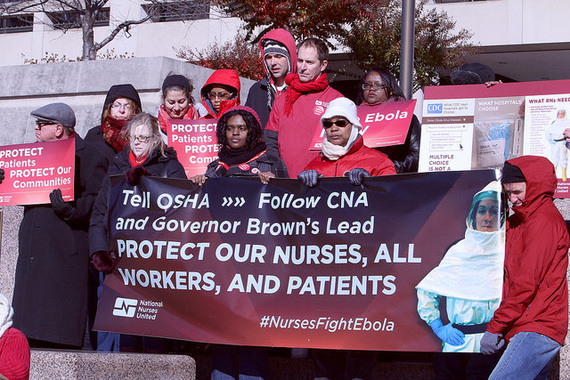Nurses worked everyday throughout the Thanksgiving holiday. That is the expectation of their job; that is the expectation of their calling.
That will hold for the rest of the holidays when most of us are looking for down time and when international travel will be at one of the highest peaks of the year. That increase in travel poses additional risks to the ones on the front lines in health care. It should go without saying that those caregivers should have maximum protection from harmful viruses or other disease agents that can impose themselves as care is provided.
Ebola, surging again in Sierra Leone, has now infected some 16,000 people with a fatality rate of about 60 percent in the most intense transmission countries according to the World Health Organization.
Though Ebola media coverage has now receded in the U.S., this pandemic, the worst Ebola outbreak in history, is far from over. International travel is a reminder of our interconnected global community, and a disease that has already leaped a very large ocean.
Scientific consensus on possible modes of Ebola transmission is not yet concluded. But there is consensus that health workers are at particular risk of exposure, have been infected in what the WHO calls unprecedented numbers, and if we can not stop contagion in our hospitals where the danger of infection is greatest, all of the public is at heightened risk.
Yet, to attempt to achieve safety standards, nurses have had to rally, speak out, strike, and engage in other forms of protest for safety measures in the workplace. Their concerns were heard and addressed only in California where state regulations mandating optimal safety at all hospitals were quickly put in place by the seasoned and intelligent Governor Brown.
California hospitals are now required to have the highest level of personal protective equipment and training procedures for the express purpose of ensuring that hospitals and health care workers "take the proper steps to safely provide care for suspected or confirmed Ebola patients," as the California Occupational Safety and Health Administration stated.
But in 49 other states, safety remains optional for hospitals to include in their protocols. And, as a Washington Post report noted November 28, U.S. officials are "running into resistance" in trying to set up a network of hospitals to care for Ebola patients due primarily to factors of cost, which increasingly is a higher priority for profit-focused hospitals than caring.
We have to ask ourselves as a nation what do our values actually mean. Nurses rank the highest year after year in polls on public trust. Yet when it comes to their own safety nurses have to wage battle in most parts of the nation.
Bellevue Hospital in New York was one exception when it came to caring for an Ebola patient, because it is part of a public health system. Most other hospitals could have been Texas Health Presbyterian in Dallas. The death of one patient after apparently lax standards and the exposure of two nurses sent fear and chills through most nurses who know how profoundly their hospitals are underprepared for epidemics in a fragmented health care industry with little public oversight.
The California standards have created a national benchmark for not just Ebola, but for all infectious diseases in a time where epidemics are increasing as a result of global travel, mutating viruses, antibiotic resistant super bugs, and the effects of the climate crisis.
While we enjoy the holidays, nurses at Bellevue and nurses in California receive care in exchange for caring. The rest of the nation's nurses may well be working unguarded, unprotected and one patient away from whatever walks into the door.
We can do better as a nation. Federal OSHA has the power to follow the lead of Governor Brown's California mandate. Nothing short of that should be acceptable to any policy maker in this nation.


